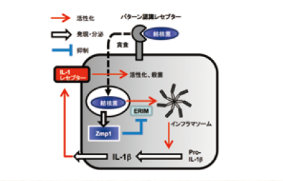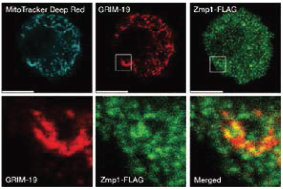Molecular Microbiology Group
The Molecular Microbiology Group is dedicated to basic researches on immune response to infections of tropical area, especially tuberculosis. Through analyses of interaction between host immune system and Mycobacterium tuberculosis (Mtb), the causative bacteria of tuberculosis, we intended to develop new strategies to control tuberculosis. Mtb produces virulent factors Zmp1 which suppress protective cytokine IL-1β. We have identified a novel Zmp1-binding protein Grim-19 which is a component of mitochondrial complex I (Fig 1 and 2).
The innate immune memory, so-called “trained immunity”, has recently received increased attention. Because trained immunity can enhance the host defense against broad types of pathogens, it may be applicable to control various infectious diseases including COVID-19. It has been shown that avirulent Mtb strain BCG induces IL-1β-dependent trained immunity in humans and mice. We are currently developing Zmp1 inhibitors to induce trained immunity by BCG more efficiently.
Our Group members also hold posts in the Graduate School of Medicine (Department of Host Defense) and participate in the Graduate Education Program at the University of the Ryukyus.

図1:結核菌が分泌する病原因子Zmp1による感染防御免疫抑制の模式図。Zmp1が感染マクロファージのERIMに結合し、その結果、NLRP3インフラマソーム活性化によるpro-IL-1bの切断とIL-1b産生、それに引き続く殺菌活性増強を抑制する。

図2:結核菌(BCG株)が産生する病原因子Zmp1はミトコンドリア電子伝達系複合体IサブユニットGRIM-19に結合して感染によって誘導されるIL-1βの産生を抑制する。マウスマクロファージ細胞株J774.1にZmp1-FLAGを発現するBCGを感染させて、Zmp1- FL AGと細胞内在性のG R I M – 1 9 を蛍光免疫染色法で検出した。同時にMitoTracker Deep Redを用いてミトコンドリアを可視化した。下段の写真は上段の四角部分の拡大図を示す。
Member
| Position | Name |
|---|---|
| Professor | Goro MATSUZAKI(Lab HP) |
| Assistant Prof. | Masayuki UMEMURA |
| Assistant Prof. | Giichi TAKAESU |
| Adjunct Associate Prof. | Toshihiro KONNO |
